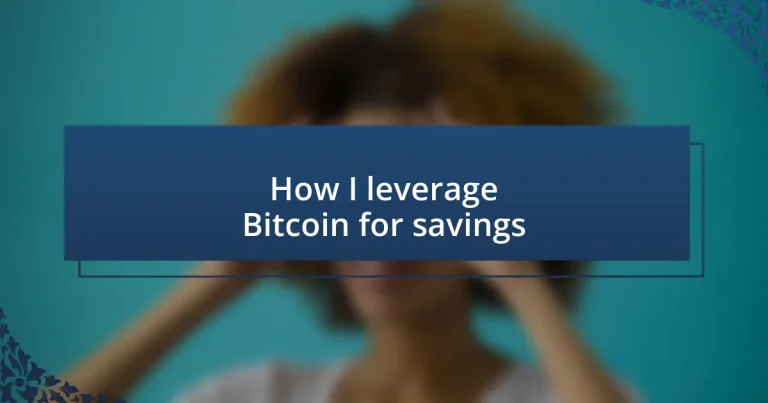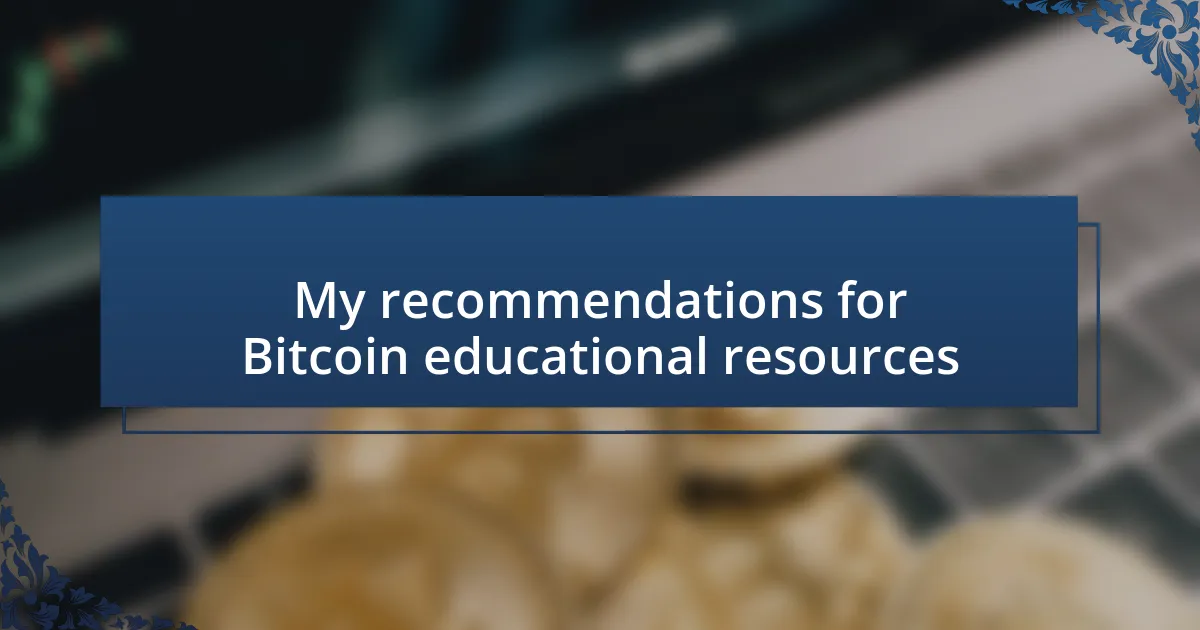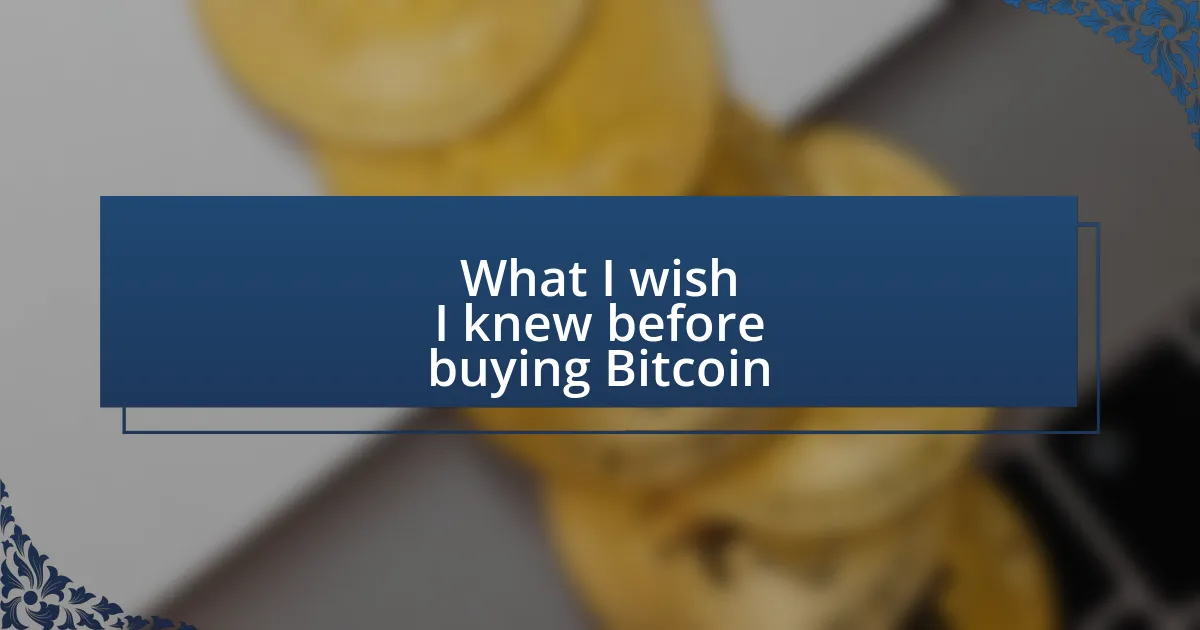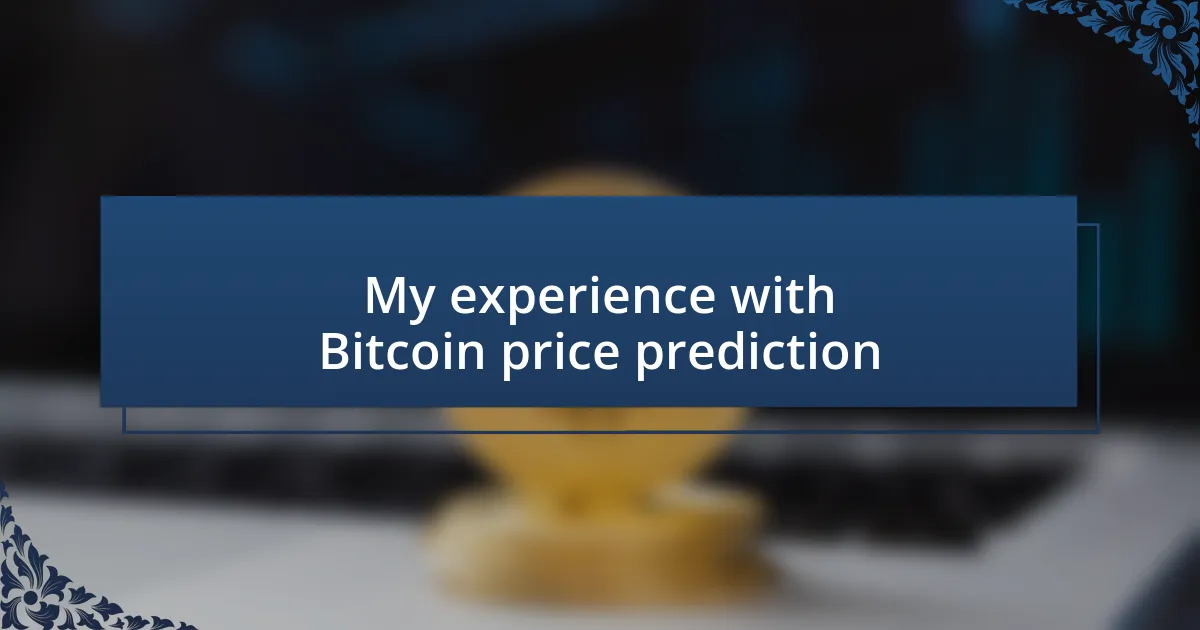Key takeaways:
- Bitcoin operates on decentralized blockchain technology, providing an independent alternative to traditional currencies.
- Selecting the right Bitcoin wallet involves balancing security and convenience; enabling two-factor authentication is crucial for additional protection.
- Buying Bitcoin safely requires thorough research on exchanges, using secure payment methods, and avoiding impulsive decisions.
- Diversifying holdings and regularly contributing to Bitcoin savings can enhance financial strategies, while staying informed about market trends is essential for making informed decisions.
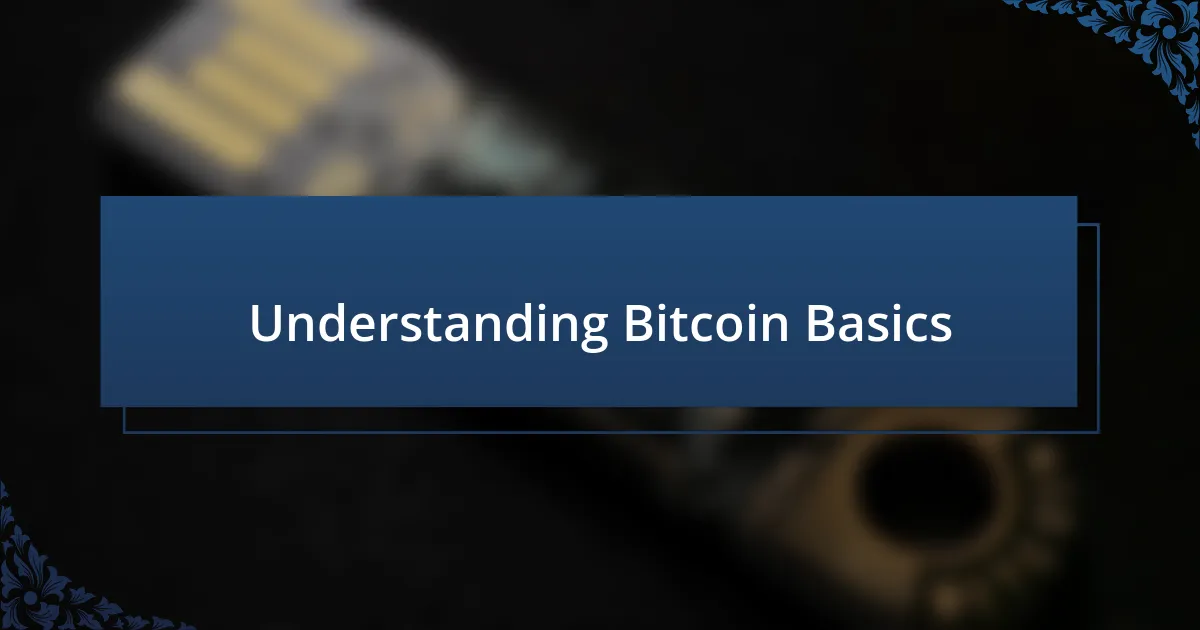
Understanding Bitcoin Basics
Bitcoin, often referred to as digital gold, is a decentralized cryptocurrency that operates on blockchain technology, which essentially is a public ledger of all transactions. I still remember the first time I wrapped my head around the concept of blockchain; it felt like unlocking a door into a new dimension of finance. How could a currency exist without a central authority? This independence is what makes Bitcoin so appealing.
When I first bought Bitcoin, I did it out of curiosity more than anything else. It was fascinating to see how this digital asset had the potential to grow in value and act as a hedge against inflation. As I delved deeper into its mechanics, it became clear to me that Bitcoin’s limited supply—capped at 21 million coins—would play a crucial role in its value over time. Isn’t it intriguing to think about how scarcity can drive demand in a world overflowing with fiat currency?
Understanding Bitcoin isn’t just about knowing what it is; it’s about recognizing its potential impact on traditional financial habits. The more I learned, the more I realized how empowering it feels to take control of my savings, rather than leaving it all in a conventional bank account. With every fluctuation in the market, I find myself asking: how can I adjust my strategy to make the most of this digital asset?
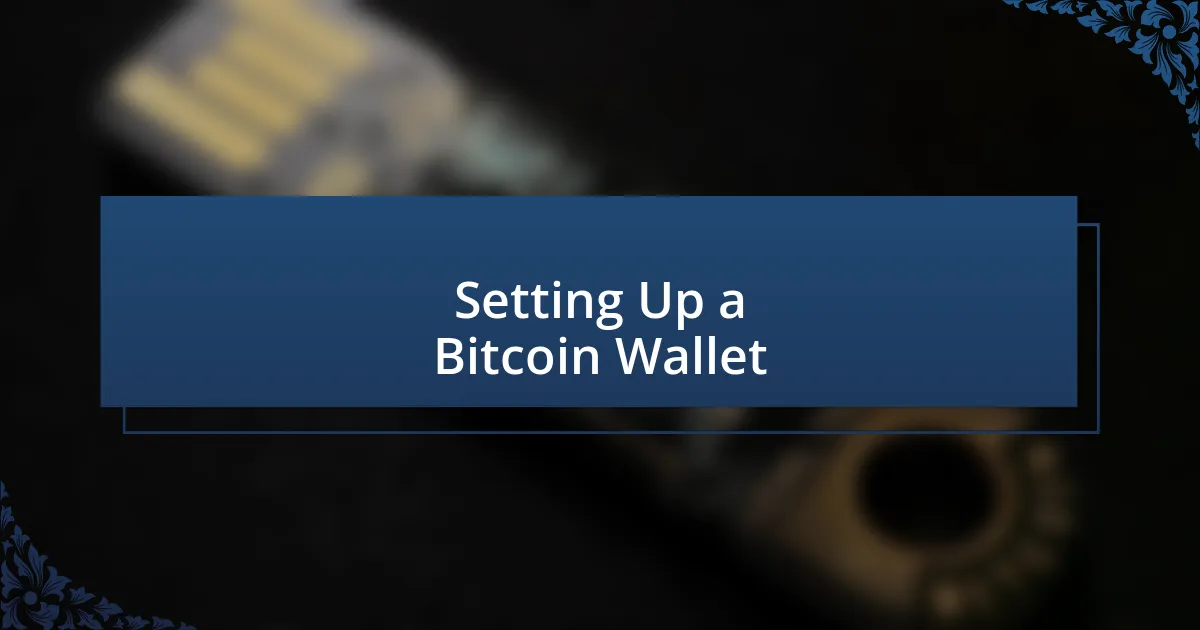
Setting Up a Bitcoin Wallet
Setting up a Bitcoin wallet is your first step toward managing your digital currency. I remember the moment I chose my wallet—there were so many options, each promising unique features. It felt a bit overwhelming, but once I narrowed it down based on my needs, it turned into an exciting part of my Bitcoin journey.
When selecting a wallet, I consider security, convenience, and the ability to easily access my funds. For example, a hardware wallet offers unparalleled security for long-term storage but might be a tad cumbersome for quick transactions. In contrast, a mobile wallet is user-friendly and perfect for everyday use, but it comes with certain risks, like being vulnerable to malware. I’ve learned that finding the right balance is essential.
As I embarked on this process, I also made sure to enable two-factor authentication (2FA) for my wallet. This simple step added an extra layer of security that brings peace of mind. Have you ever experienced that nagging worry about online security? By taking proactive steps, I felt more in control of my funds. Below is a comparison table of different wallet types that can help you make an informed decision.
| Wallet Type | Pros | Cons |
|---|---|---|
| Hardware Wallet | High security, offline storage | Less convenient for frequent transactions |
| Mobile Wallet | User-friendly, convenient | Vulnerable to malware and hacking |
| Web Wallet | Accessible anywhere, easy setup | Less secure, reliant on third parties |
| Paper Wallet | No online exposure, secure | Easily lost, not user-friendly |
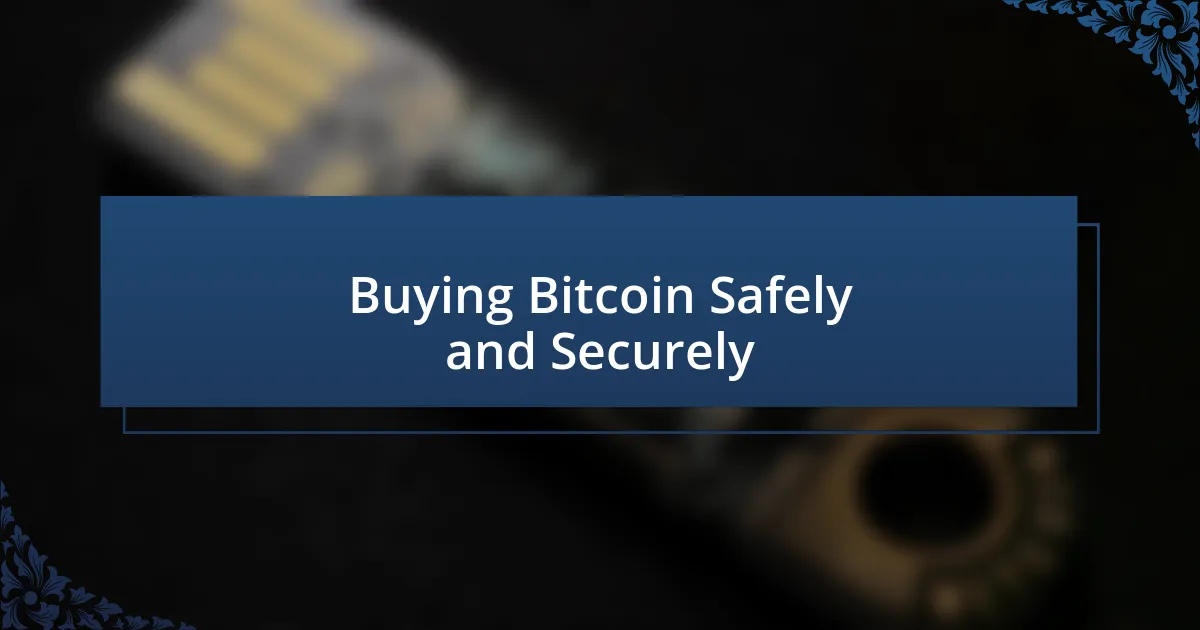
Buying Bitcoin Safely and Securely
When I decided to buy Bitcoin, I was overwhelmed by the number of exchanges available. However, choosing a reputable exchange was a game-changer for me. It’s crucial to pick one with a good track record for security and customer support. I still remember the relief I felt after doing thorough research and finding an exchange that ticked all my boxes. It made the buying process much smoother and less stressful.
Here are some key tips I applied to buy Bitcoin safely and securely:
- Research and choose reputable exchanges: Look for platforms with positive reviews and robust security measures.
- Check for two-factor authentication: Whenever possible, select exchanges that offer 2FA to enhance your account security.
- Use secure payment methods: Credit cards and bank transfers are generally safer than other options, like cash.
- Avoid public Wi-Fi: My experience taught me that conducting transactions on a secure, private network minimizes risks.
- Keep emotional decisions in check: I learned the hard way that buying in a panic can lead to mistakes, so I always allow myself to take a breather before making a purchase.
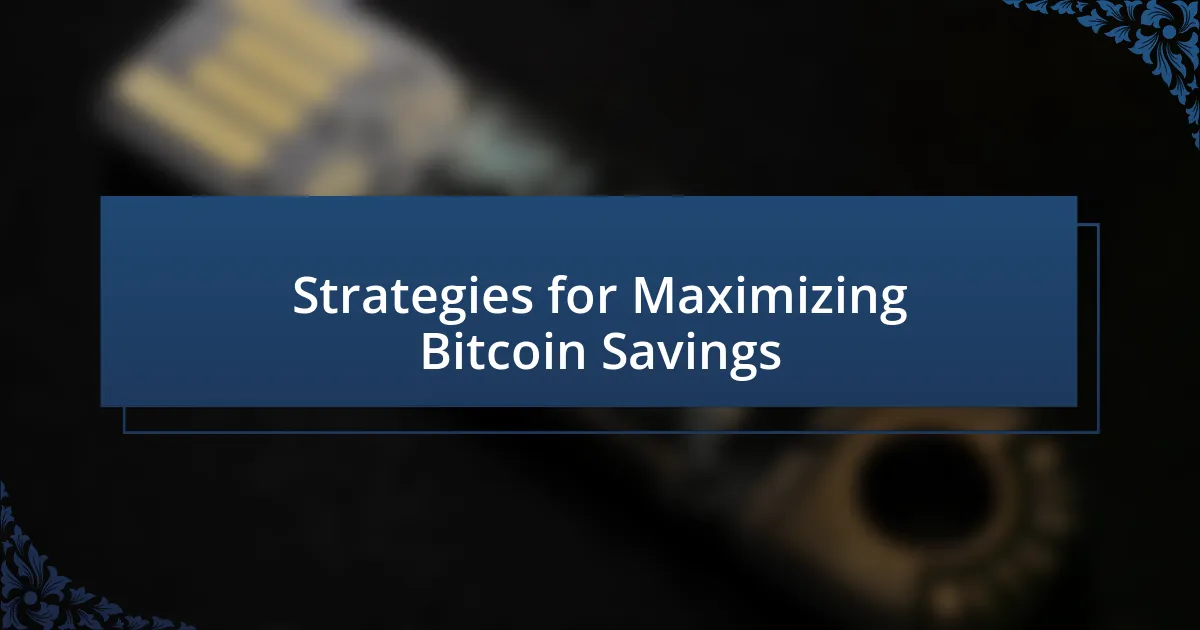
Strategies for Maximizing Bitcoin Savings
Diversifying your Bitcoin holdings can significantly enhance your savings strategy. I once spread my investments across a few different cryptocurrencies to minimize risks, and it turned out to be a smart move. Instead of putting all my eggs in one basket, I allowed my portfolio to benefit from various market trends, which kept my potential gains more secure.
Another approach I find valuable is regularly contributing to my Bitcoin savings. Treating it like a monthly bill helped me develop a healthy saving habit. Automating my purchases meant I never faced the temptation to spend that money elsewhere, ensuring that my Bitcoin holdings steadily grew over time. Have you thought about how automating your savings could simplify your financial journey?
Finally, I’ve learned the importance of staying informed about market trends. When I started paying attention to news and developments in the crypto space, I felt more empowered to make informed decisions. Knowledge can be your best ally, especially when deciding when to buy or sell. So, what steps are you taking to keep your finger on the pulse?
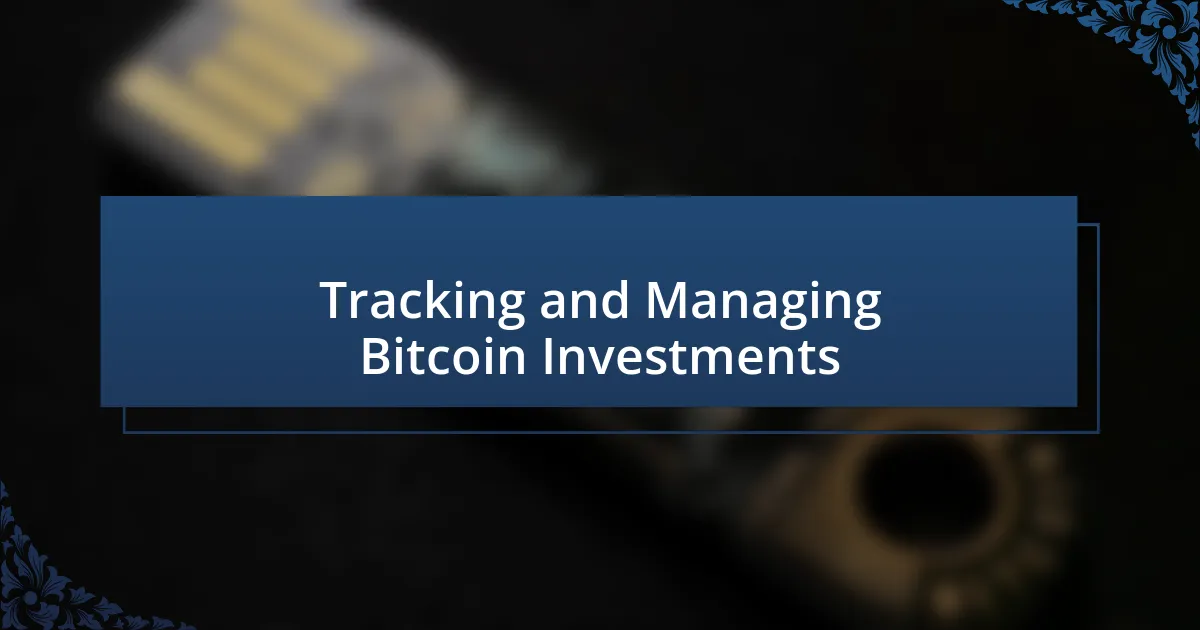
Tracking and Managing Bitcoin Investments
To effectively track my Bitcoin investments, I use a combination of mobile apps and spreadsheets. I’ve found that apps like Blockfolio and Delta offer a user-friendly interface for real-time updates on my portfolio’s performance. Whenever I see my value fluctuate, it’s a mix of excitement and anxiety—how do you keep your emotions in check when the market moves?
Additionally, I regularly assess my holdings to ensure they align with my financial goals. Last year, I realized one of my altcoins underperformed, and I had to rethink my strategy. This experience taught me the importance of being adaptable. Have you ever faced a situation where an investment didn’t pan out as you expected?
I also take advantage of alerts and notifications from trading platforms. When Bitcoin hits a certain price threshold, I get a nudge that prompts me to assess whether to hold, sell, or buy more. This proactive approach allows me to stay engaged without constantly staring at my screen. How do you maintain your focus while balancing other life commitments?
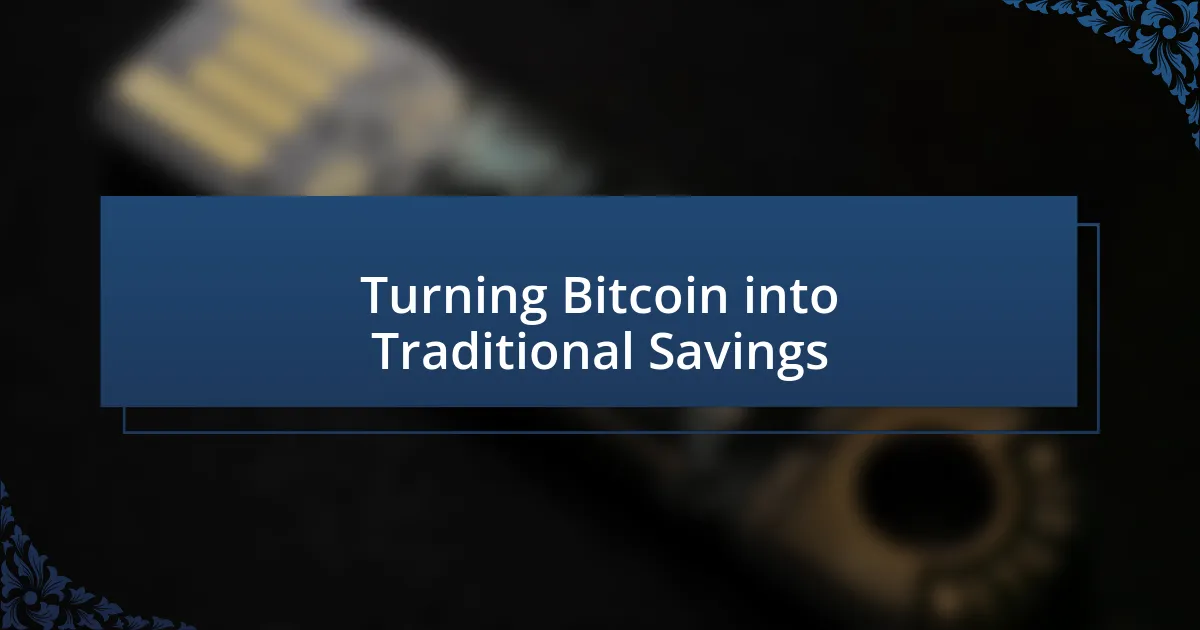
Turning Bitcoin into Traditional Savings
To turn Bitcoin into traditional savings, I often consider the timing of when to convert my holdings. I recall a time when Bitcoin surged significantly, and I felt an overwhelming urge to cash some of it out. That moment was bittersweet; while I was thrilled with the gains, I also felt the weight of missing out on future increases. It’s a delicate balance, isn’t it? Knowing when to take profits can feel like a gamble.
Another strategy I use is to set specific savings goals that align with my conversion timing. For instance, I aimed for a family vacation last year and strategically planned my Bitcoin conversion in increments to fund it. Watching the market fluctuate in the lead-up to my goal made me appreciate both the volatility and the necessity of patience. Have you ever leveraged your investments for a specific purpose? I bet it can be rather rewarding when everything aligns.
Lastly, I like to maintain a clear understanding of my local banking regulations regarding cryptocurrency in order to facilitate smooth conversions. When I first entered the world of Bitcoin, I was overwhelmed by how different these processes were from traditional banking. I remember feeling nervous on my first attempt to convert Bitcoin into cash, but completing that transaction offered me a sense of relief and accomplishment. How do you feel about the nuances of managing your cryptocurrency within the confines of conventional banking?

